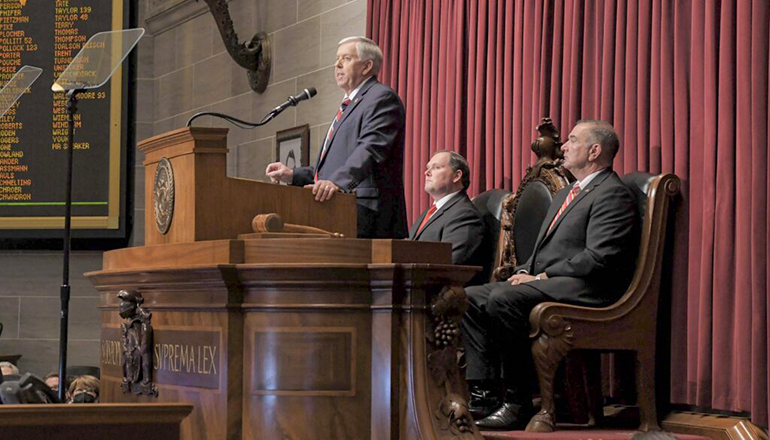(Missouri Independent) – Spending from large federal grants and a shrinking but substantial state surplus will propel Missouri to record spending in the coming year if lawmakers adopt the $52.7 billion budget proposal from Gov. Mike Parson.
Unlike last year’s budget proposal, which included nearly $900 million from general revenue to improve Interstate 70, Parson has no large proposals for using the surplus that was nearly $6.4 billion at the end of December.
Instead, increases in ongoing spending, including raises for teachers, more for higher education and childcare, and funding to study improvements on Interstate 44 are among the more notable items in the fiscal 2025 budget. The immediate reaction from lawmakers ranged from praise for Parson’s continued commitment to infrastructure and schools to promises that every increased or new item would be subject to intense debate.
Last year, lawmakers boosted Parson’s plan for I-70 to $1.4 billion in general revenue and $1.4 billion in borrowed funds for widening the highway from Wentzville to Blue Springs. Interest from that money, about $14 million, will pay for studies to do the same for all or portions of I-44.
In an advance copy of his annual State of the State address, Parson said he’s proud of the investments his administration has made in roads and bridges.
“While road and bridge repair might not be the most exciting topic…it is one that impacts all Missourians the most,” Parson was expected to tell a joint session of the legislature on Wednesday.
Overall, the budget anticipates spending $15 billion from general revenue, which will reduce the surplus in that fund to about $1.5 billion by June 30, 2025.
The proposal to use the surplus will meet opposition from House Budget Committee Chairman Cody Smith if Parson wants to use it to increase spending for ongoing programs. Smith said he hadn’t had time to dig deeply into the budget but said he wants ongoing spending to stay within the limits set by current revenue.
“If he is recommending that we use the surplus to balance ongoing expenditures or supplement ongoing expenditures, then absolutely I expect that we will have to make some reductions in his recommendations,” Smith said.
Priorities for increases will be public schools, transportation and any additional costs for the Medicaid program, Smith said. Increases for higher education institutions and other increases tied to inflation would have a lower consideration.
On the Senate side of the Capitol, where GOP factional feuds promise a very difficult session, members of the Freedom Caucus have promised they will debate every increased item and every new item in the budget.
“We’ve not seen a copy of the governor’s budget recommendations yet, so we don’t know what (new items are) included but they will be on under a microscope, that’s for sure,” said Sen. Denny Hoskins of Warrensburg. Hoskins was removed from his seat on the Senate Appropriations Committee on Tuesday because of Freedom Caucus stall tactics on the floor.
Sen. Bill Eigel of Weldon Spring, a candidate for governor, said he views a record budget as a challenge.
“It sounds like it’s gonna be a long discussion on the budget over on the Senate side,” Eigel said. “The fact that we have such a big budget is a real indication at this point that we need to reduce the size of government.”
Senate Appropriations Committee Chairman Lincoln Hough of Springfield said he wasn’t surprised by Parson’s budget proposal because it continued an emphasis on infrastructure.
Hough said he is ready for the challenge of debating each line.
“Bring it on,” he said. “I’ll go all day.”
Parson will leave office in January and give his successor the biggest surplus any governor has left the state, Aaron Willard, Parson’s chief of staff, told reporters shortly before Parson’s speech
“We really believe that we have overseen transformational changes in the state of Missouri, and I did not say that lightly,” Willard said.
Highlights of the budget proposal include:
- A $120.6 million increase to fully fund the education foundation formula at $3.7 billion, plus $14 million to fully fund school transportation and $4 million to boost base teacher pay to $40,000 a year.
- A 3% increase for higher education operating budgets plus $314.7 million to fund new construction on all two- and four-year institutions.
- A 3.2% pay raise for all state workers, plus an increase for longevity – 1% for every two years on the job up to 10% – for employees who work in residential facilities such as youth incarceration centers, state schools and mental health facilities.
- $1.5 billion in federal funds to expand broadband access statewide.
- $51.7 million to increase state subsidies for child care.
When Parson signed the current year’s budget – after vetoing 201 spending items, totaling $555 million – the surplus of all state funds stood at about $8 billion. After transferring money for the I-70 project, plus setting aside $300 million for expansion of the Missouri Capitol Building, the surplus in all funds is about $6.4 billion, including $4.3 billion of general revenue.
Budget officials anticipate that the general revenue surplus will be reduced to about $3 billion by the end of June, when the fiscal year concludes.
Revenues are stable at about $13.1 billion annually but growth will be negligible. As a result, income tax cuts based on revenue growth will be delayed, officials said.
Through Tuesday, revenues during the current fiscal year have grown by 0.7% and if that trend continues, the treasury will take in $142 million more than estimated. That won’t, however, be enough to trigger the next step in a series of tax cuts passed during a fall 2022 special session.
The current top rate on income taxes is 4.8% and will fall to 4.7% in the year after revenues grow by at least $200 million. Two additional tax cuts, also predicated on $200 million in revenue growth, are also in state law.


